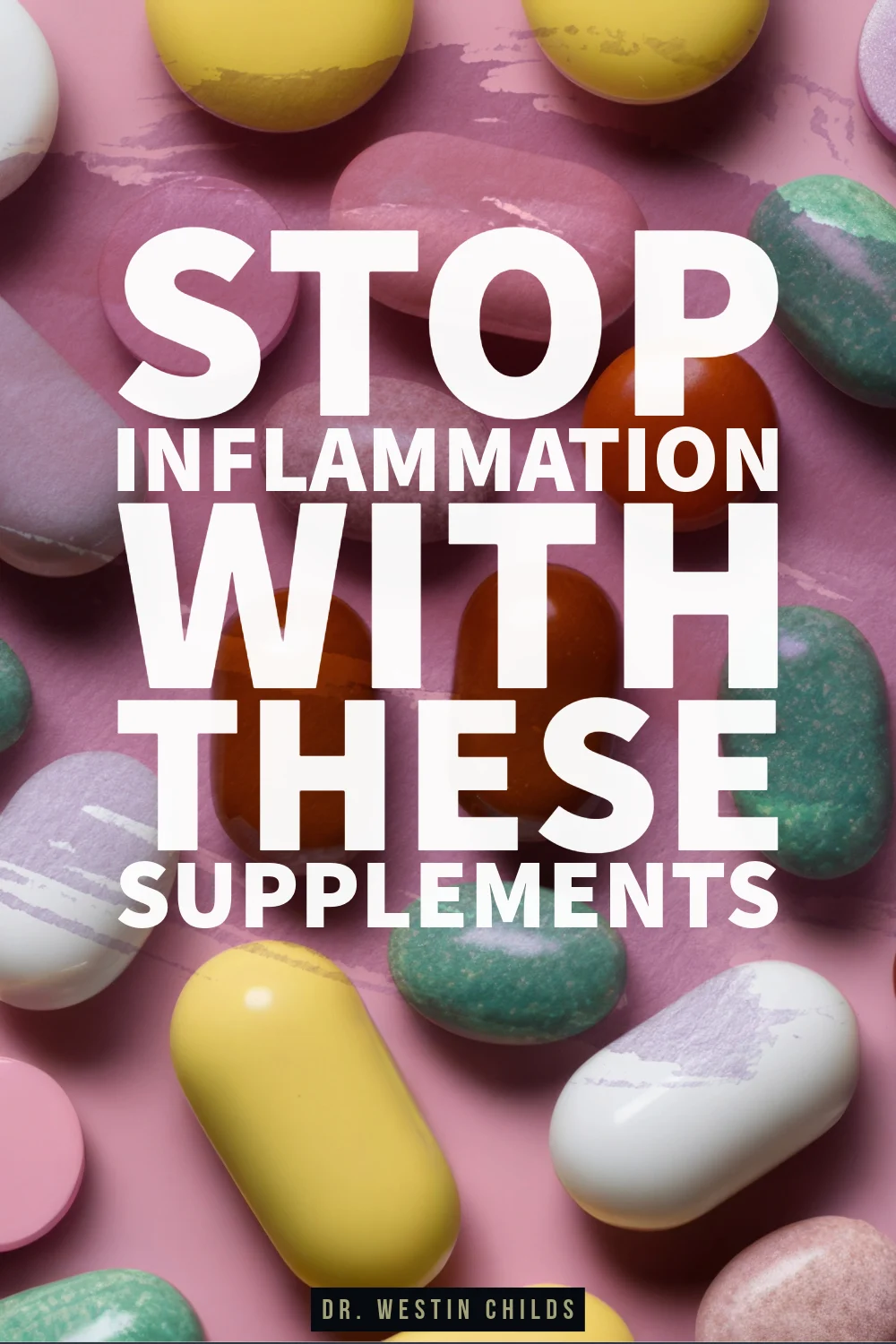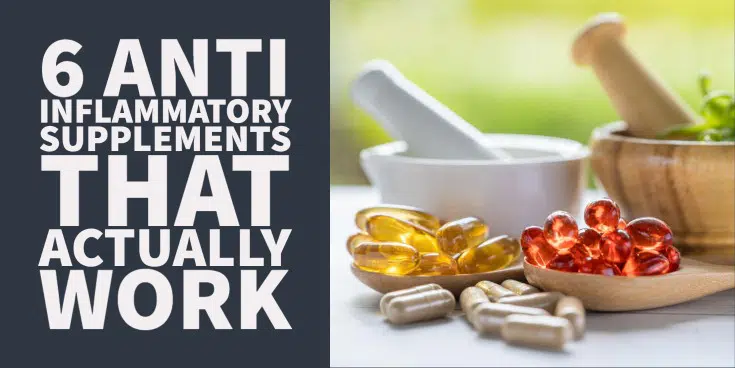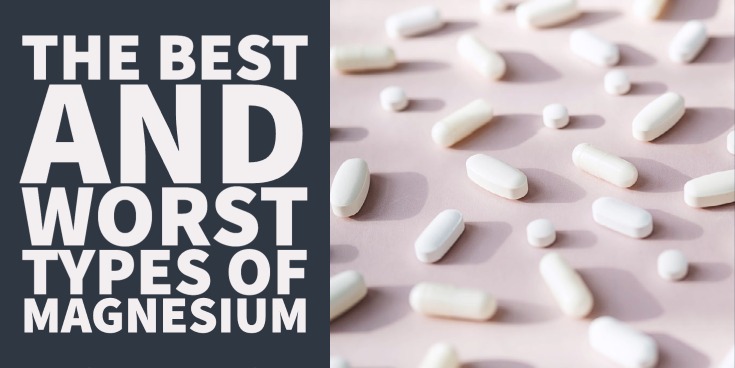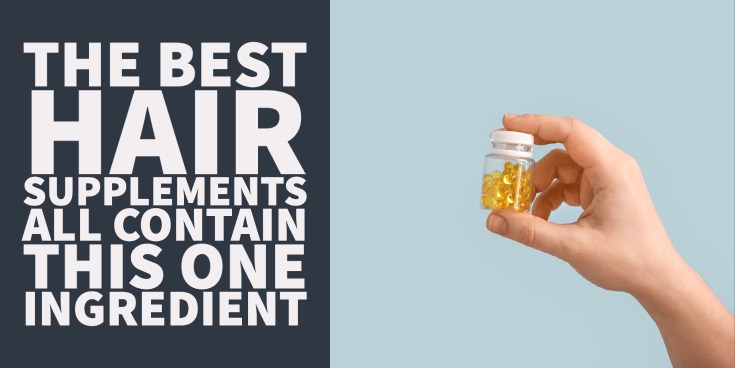Here’s why you should care about inflammation:
Reducing inflammation can help you lose weight, balance your hormones, reduce joint pain, sleep better, balance your immune system, age more gracefully, give you more energy, improve your cholesterol, reduce cardiovascular disease, and much more.
This is really just the tip of the iceberg.
When you look at inflammation from a 35,000-foot view, you start to see that it is really at the heart of pretty much every malady and disease that we know of, at least to some degree.
This means controlling and regulating inflammation should be front and center if you want to live a long and healthy life.
But before we talk more about controlling it, let’s at least define it.
So what is inflammation and is it a bad thing?
Not necessarily, in fact, inflammation can sometimes be a good thing.
It is just the process by which your body identifies that something is wrong and inflammation is the response that your body uses to try and fix that problem.
Inflammation, at least in the short term, can be a good thing.
When you get a cut on your finger and it gets red, swollen, and tender, that’s inflammation and it’s helping your body heal your wound (1).
Your body also uses the inflammatory pathways to help fight off infections from things like bacteria and viruses.
In these cases, inflammation did something good! It helps your body get back to a normal state.
But on the flip side, if inflammation becomes prolonged (2) (chronic) it starts to cause issues.
Let’s go back to the example of the cut on the finger to explain this further.
Most of the time, when you get a small cut on your finger it gets healed by the body rather quickly.
But what if you keep bumping your finger against things to prevent its healing?
If you do this, the inflammation may become prolonged and will actually prevent healing over time.
In this way, short-term inflammation is often beneficial to the body and long-term inflammation is often detrimental.
And this sort of long-term chronic inflammation is the problem that most people (including you) are dealing with.
This type of chronic inflammation stems from things like:
- Autoimmune disease
- Gut issues
- Lingering infections
- Constant exposure to allergens, irritants, or chemicals
- Consumption of inflammatory oils and processed foods
- Lack of sleep
- Constant and excessive stress
- And lack of exercise
These are some of the most common drivers of the harmful type of inflammation that you don’t want in your body.
That’s the bad news, the good news is that this type of inflammation can be addressed with the right supplements.
Which is exactly what we are going to be discussing today…
Reduce Inflammation With These Supplements
Before we talk about these supplements you need to understand this concept:
Each supplement mentioned here is often beneficial for treating specific types of inflammation depending on their cause and location.
For instance, inflammation can stem from the gut, from allergies, or it can be localized to specific locations like your joints.
What you will soon learn is that certain ingredients and supplements work better for specific types and causes of inflammation.
It’s not that they can’t or won’t help reduce inflammation in your entire body, but it is the case that some will work better for joint pain, back pain, or even autoimmune disease.
For this reason, it’s important to understand a little bit about each one.
#1. Alpha-lipoic acid
First up we have alpha-lipoic acid often abbreviated as ALA.
Alpha-lipoic acid is a compound with antioxidant properties commonly found in plants.
Plants that contain high levels of ALA include (3):
- Broccoli
- Spinach
- Red meat
- Brussels sprouts
- Peas
- And carrots
You will find that many of the ingredients we will be discussing today are naturally occurring in certain plants which is one of the reasons why a whole-food diet is so great for treating inflammation!
Many of these supplements take the active compounds in these plants and concentrate them into a capsule that you can take daily.
While this strategy is great, I would also strongly encourage you to make sure you consume as many of these plants as possible in your diet as well.
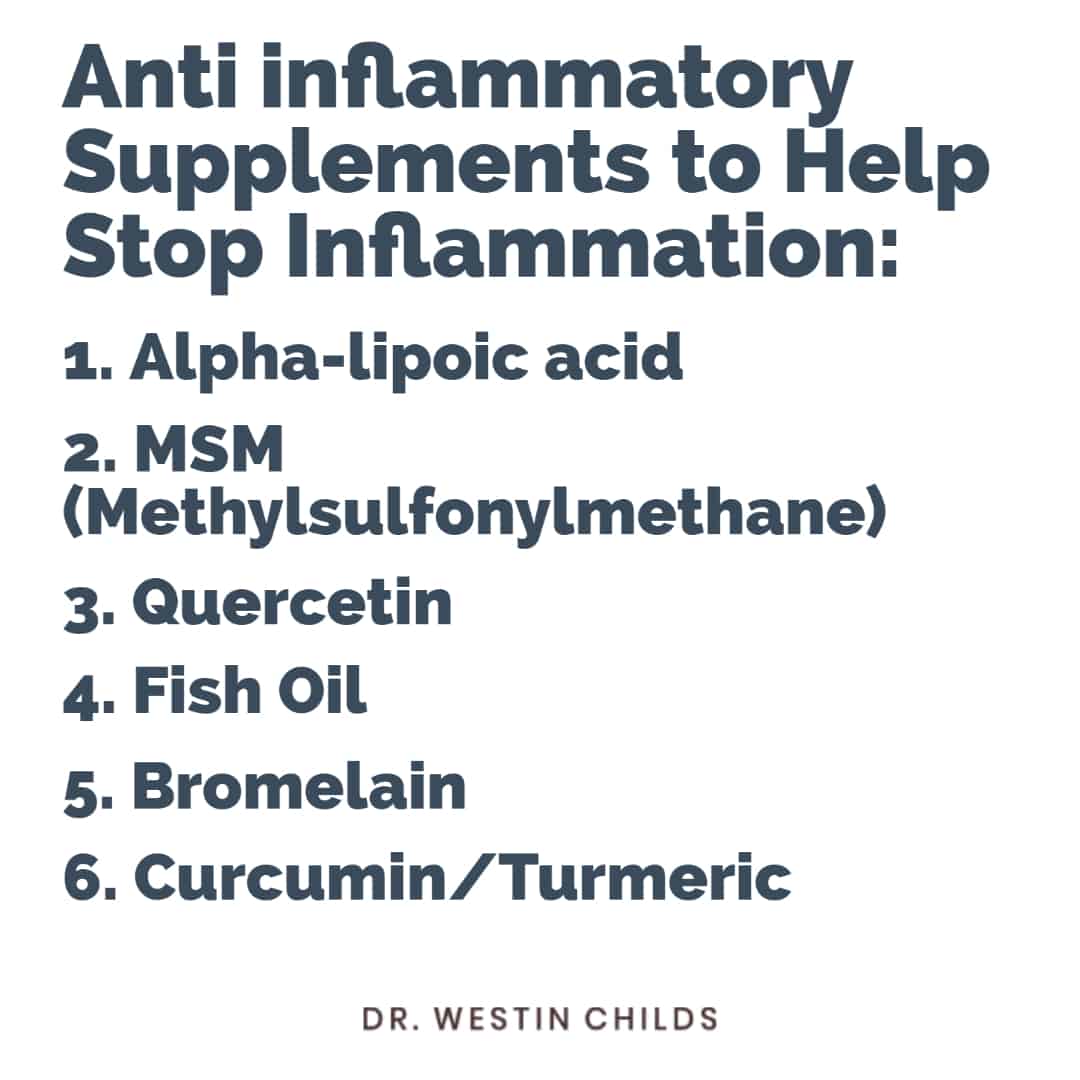
Doing this will yield even better results.
Even though alpha-lipoic acid does have a beneficial effect on treating broad-based inflammatory diseases, it is especially helpful in treating inflammation from diabetes and diabetes complications such as peripheral neuropathy.
If you are suffering from diabetes (4), pre-diabetes, insulin resistance, high blood sugar, elevated hgb A1c, weight gain, or peripheral neuropathy (5) then ALA is a great option to consider for inflammation control.
To get the anti-inflammatory benefits you will want to use a dose somewhere between 600mg and 1,800mg per day.
If possible, try to get a sustained-release version of ALA instead of an immediate release.
The longer you can keep blood levels of ALA sustained (6), the better impact you will have on inflammation.
Sustained-release ALA is often more expensive compared to regular versions but the expense is worth it (in this case).
Not only does alpha lipoic acid assist with reducing inflammation, it may also help with weight loss, especially when combined with berberine.
#2. MSM (Methylsulfonylmethane)
Next, we have a compound called methylsulfonylmethane (7), or MSM for short.
MSM is naturally found in green vegetables, algae, fruits, adrenal glands, and milk.
While we know that MSM helps target inflammation we aren’t 100% sure how it works.
It is believed that it helps improve how nutrients are being shuttled in and out of your cells.
Your cells have a protective membrane around them known as the phospholipid bilayer (8).
This polar membrane is designed to keep bad things from getting in while allowing good things to enter.
Certain states, including inflammation, can disrupt how well this process occurs.
In other words, your cells become “leaky” in the sense that they are no longer being protected.
It is suspected that the consumption of industrial seed oils (such as those found commonly in processed foods and fast foods) disrupts this membrane when fatty acids are incorporated into the membrane in place of other types of fats.
Disruption to your cellular membrane can lead to all sorts of problems including a reduction in energy production (9) from your mitochondria and damage to your cells.
Neither of these is ideal.
Taking MSM may help to support the structure and function of your cellular membranes such that they become less leaky and better able to perform their protective function.
In other words, they help good things get into your cells and prevent bad things from getting in.
Because of this, MSM is often used as an anti-inflammatory supplement to help with detoxification.
So if you suspect that an overload of endocrine-disrupting chemicals is the cause of your inflammation then using MSM is probably preferred over other types of anti-inflammatory supplements.
MSM is also ideal for those suffering from joint pain, arthritis, and osteoarthritis.
For best results, you will want to take between 1,000mg and 1,500mg of MSM split into 500mg doses throughout the day.
#3. Quercetin
Third on the list is a compound known as quercetin.
Quercetin is a flavonoid and it is primarily found in leafy greens, tomatoes, berries, and broccoli.
Flavonoids are groups of nutrients found specifically in fruits and vegetables.
Certain types of fruits and vegetables contain specific types of flavonoids and you can use these flavonoids to treat specific conditions.
Quercetin happens to be very effective at treating the following conditions:
- Broad inflammation (10)
- Allergies (11)
- Heart disease
- Pain
- Asthma
Quercetin is often complexed with bromelain (which we will be discussing in a moment) because they complement one another in terms of how and what they treat.
I find quercetin is great for inflammation that stems from the intestinal tract starting from the nose and running down into your intestines.
People who suffer from things like allergies, acid reflux, intestinal dysbiosis, and leaky gut, often benefit the most from quercetin.
The ideal dose of quercetin that you’d want to take each day is somewhere between 500mg and 1,000mg per day.
If you are treating allergies or asthma then combine quercetin with bromelain (more on that below).
#4. Fish oil
Fish oil is an oldie but a goodie and one that you are probably well familiar with.
Fish oil is simply concentrated fats that naturally occur in fish, hence the name fish oil (in reference to the fat).
Why is fish oil so good for your health?
Because it contains specific types of fats called omega-3 fatty acids.
These omega-3 fatty acids help to balance the impact of other types of fatty acids, especially omega-6 fatty acids.
You can think about it like this:
Omega 6 fatty acids act as a gas pedal on pro-inflammatory pathways inside your cells.
Omega 3 fatty acids act as a brake on these same pathways.
Because of this, your body is playing a game of tug of war between the two.
Due to the standard American diet (12), most people consume way more omega-6 fatty acids than they do omega-3 fatty acids.
Taking an omega-3 fatty acid supplement (such as fish oil) helps to balance this tug-of-war thereby reducing inflammation.
More important than your total omega 3 or omega 6 fatty acid concentration is the ratio between the two.
So for best results, you will want to consume more omega 3 fatty acids while also decreasing consumption of omega 6 fatty acids simultaneously.
People who tend to benefit the most from fish oil include:
- People with heart disease (13)
- People trying to lose weight
- Those with depression
- Those with high cholesterol or high triglycerides
- Those with broad-based inflammation
- Those trying to support immune function
- Those with autoimmune conditions
If you aren’t sure where to start and you want a good all-around supplement to treat inflammation then fish oil is the one to use.
It is particularly good at treating autoimmune conditions, helping with weight loss, and treating high cholesterol, but it also helps in a number of other conditions as well.
For best results, you will want to use around 500mg to 2,000mg per day.
Pay special attention to the DHA and EPA content of the fish oil you are consuming and less attention to the total mg component.
Quality fish oils will have higher concentrations of DHA and EPA per mg compared to lower-quality supplements.
In addition, you can also reduce the total dose needed by looking for special delivery systems that allow for sustained blood levels of omega-3 fatty acids.
If you are using a sustained-release version then you can get away with a lower dose.
For really difficult-to-treat conditions such as depression or weight gain, look at using a higher dose in the range of 2,000mg to 4,000mg of fish oil per day.
Again, make sure to combine fish oil supplements with foods high in naturally occurring omega-3 fatty acids such as wild-caught fish.
#5. Bromelain
You can think of bromelain as really the sister or brother to quercetin.
Bromelain isn’t so much a compound as it is a group of enzymes found in pineapple.
Eating pineapple, or taking a bromelain supplement, provides you with this entire group of enzymes.
And it is these enzymes that have the beneficial effects on inflammation that you want.
These enzymes can assist with the digestion of food (thereby reducing inflammation from foods), the digestion of immune complexes in the body, and help to improve gut health and microbial diversity.
Because of this, bromelain is best used to treat conditions such as:
- Allergic rhinitis (14)
- Asthma
- Food allergies
- Sinus infections
- Acid reflux
- Leaky gut
- Arthritis
- Chronic runny nose
You will find that bromelain is often found together with quercetin as well as vitamin C and these 3 nutrients work very well together.
For best results, use a dose of 500mg two to three times per day.
You can take your bromelain with a meal to assist with digestion.
#6. Curcumin/Turmeric
Lastly, we have the most well-studied anti-inflammatory supplement ingredient on the market and that is curcumin.
Curcumin is found in Turmeric which is a spice.
Because of this, you will often see turmeric and curcumin used interchangeably even though there is a slight difference.
Supplements that contain curcumin are often more powerful than those that contain turmeric because they contain the concentrated active ingredient.
Having said that, you can still get plenty of benefits from consuming turmeric as a spice as well.
It’s usually easy to spot if something has turmeric in it because of its characteristic yellow color!
Turmeric and curcumin are well known to most people, at least in the natural health arena, because they contain thousands of studies (15) showing how effective they can be.
Curcumin has been shown to help reduce inflammation (16), fight diabetes (17), balance blood sugar (18), prevent cancer (19), treat Alzheimer’s (20), manage arthritis (21), fight depression (22), and much more.
Because of this, I consider curcumin to be one of the best supplements to fight general inflammation in the body.
In other words, if you aren’t sure where to start and you want to fight inflammation, curcumin would be a great choice (along with fish oil).
Curcumin is also great for treating metabolic issues such as metabolic syndrome, weight gain, diabetes, and insulin resistance.
Pretty much the only drawback to using curcumin is that it is difficult for your body to absorb it when you take it by mouth.
For this reason, you will often find curcumin complexed with black pepper or something called Bioperine (23).
If you are cooking with turmeric or using it to make a smoothie or a healthy drink, you will often find that the recipe includes a few cranks of fresh black pepper.
Using black pepper has been shown to increase the absorption of curcumin (24) so that you can get it inside your body where you want it.
The ideal dose for curcumin is around 500mg per day but doses can vary quite dramatically.
Curcumin is usually well tolerated but I have run into a handful of people who have issues related to estrogen and testosterone when using it.
So do keep an eye out for those if you decide to take it.
Honorable Mentions (Supplements that didn’t make the list)
Believe it or not, this list is really just the tip of the iceberg.
There are plenty of other ingredients that can be used to fight inflammation.
A couple that didn’t make the main list but I will mention here include:
- Watercress – Ideal for treating those with inflammation from autoimmune disease and supporting hair, skin, and nails.
- Green tea extract – Ideal for assisting with detoxification and for improving inflammation in the liver.
- Glycosaminoglycans – Great for assisting with inflammation leading to weight gain and treating leptin resistance.
- Ginger – Great for arthritis, osteoarthritis, and joint pain.
Final Thoughts & How To Use Anti-Inflammatory Supplements
Supplements can be an incredibly useful and effective tool for helping you get control of inflammation.
The supplements that I listed above are some of my favorites but there are many others.
In order to really get a handle on inflammation, I recommend combining several types of supplements together for the best results.
That means using at least 2 or 3 different anti-inflammatory supplements simultaneously.
Each supplement works via a slightly different mechanism so combining them often gives you more benefit than using just one at a time.
In addition, try to target your supplementation to the issue you are experiencing.
If your inflammation is leading to joint pain, for instance, then look for anti-inflammatory supplements that are better at targeting your joints.
If your inflammation is leading to weight gain then look for anti-inflammatory supplements that are better at targeting conditions such as insulin resistance and leptin resistance.
If you are looking to just live a healthier life and reduce overall inflammation then look for supplements that have more broad anti-inflammatory support.
As always, make sure you use supplements with healthy lifestyle changes such as eating whole foods with lots of fruits and veggies, exercising regularly, getting enough sleep, and managing your stress.
The combination of these changes with supplements should help you reduce inflammation and feel better!
Now I want to hear from you:
Are you struggling or dealing with inflammation right now?
If so, what type of issues are you experiencing?
Are you currently taking any supplements to try and fight inflammation? If so, which ones?
Are you thinking about taking any of the supplements listed above? If so, which ones?
Leave your questions or comments below!
Scientific References
#1. https://pubmed.ncbi.nlm.nih.gov/21740602/
#2. https://www.ncbi.nlm.nih.gov/books/NBK493173/
#3. https://lpi.oregonstate.edu/mic/dietary-factors/lipoic-acid
#4. https://www.ncbi.nlm.nih.gov/pmc/articles/PMC3221300/
#5. https://www.ncbi.nlm.nih.gov/pmc/articles/PMC3272801/
#6. https://pubmed.ncbi.nlm.nih.gov/19403400/
#7. https://www.ncbi.nlm.nih.gov/pmc/articles/PMC5372953/
#8. https://www.ncbi.nlm.nih.gov/books/NBK26871/
#9. https://www.ncbi.nlm.nih.gov/pmc/articles/PMC5952932/
#10. https://www.ncbi.nlm.nih.gov/pmc/articles/PMC4808895/
#11. https://www.ncbi.nlm.nih.gov/pmc/articles/PMC7227109/
#12. https://pubmed.ncbi.nlm.nih.gov/21139124/
#13. https://pubmed.ncbi.nlm.nih.gov/20699674/
#14. https://pubmed.ncbi.nlm.nih.gov/24273953/
#15. https://www.ncbi.nlm.nih.gov/pmc/articles/PMC5664031/
#16. https://pubmed.ncbi.nlm.nih.gov/19594223/
#17. https://www.ncbi.nlm.nih.gov/pmc/articles/PMC8126655/
#18. https://www.ncbi.nlm.nih.gov/pmc/articles/PMC3857752/
#19. https://www.ncbi.nlm.nih.gov/pmc/articles/PMC7446227/
#20. https://www.ncbi.nlm.nih.gov/pmc/articles/PMC2781139/
#21. https://pubmed.ncbi.nlm.nih.gov/27533649/
#22. https://www.ncbi.nlm.nih.gov/pmc/articles/PMC7728608/
#23. https://www.ncbi.nlm.nih.gov/pmc/articles/PMC7353321/
#24. https://www.ncbi.nlm.nih.gov/pmc/articles/PMC3918523/
